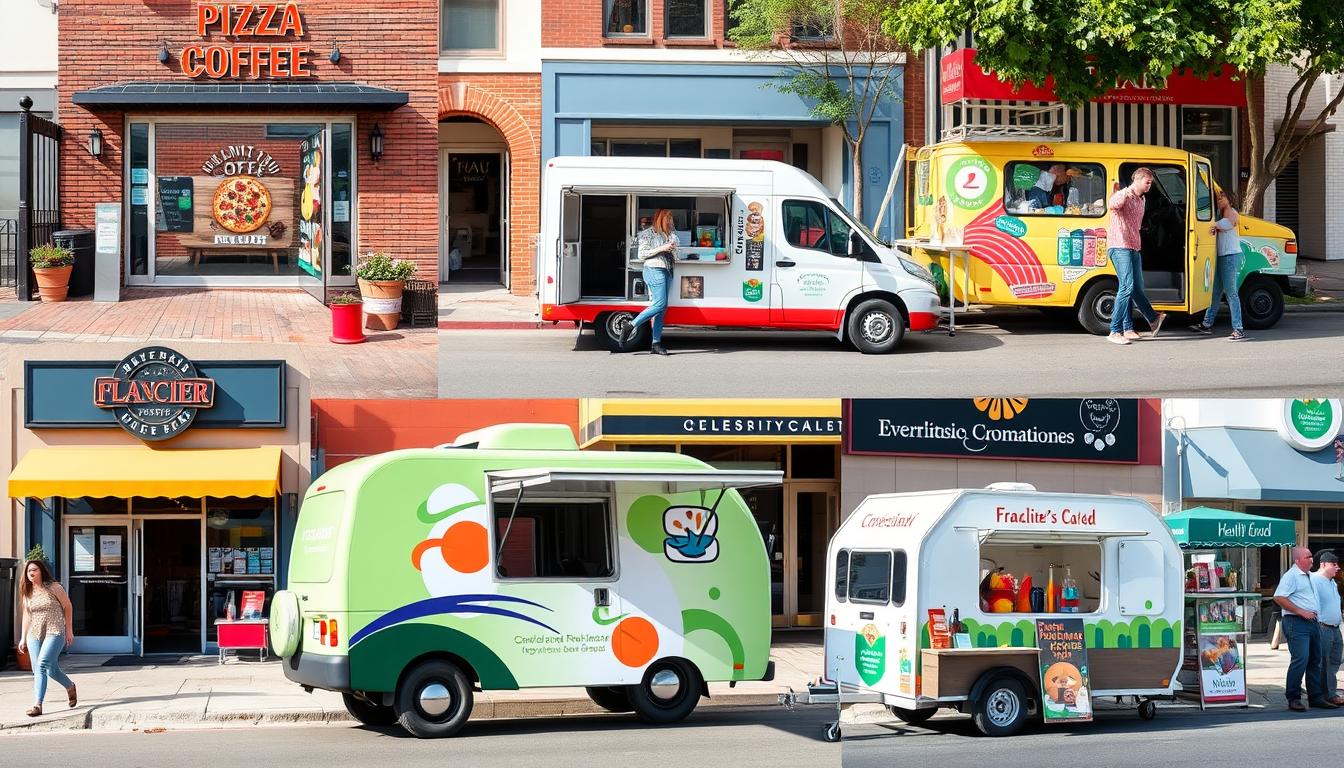Ever thought about starting your own business without spending a lot? The franchising world offers many low-cost options for new entrepreneurs. In the U.S., there are 805,000 franchises that make over $860 billion each year. This shows a big market and a big economic impact.
This article looks at the cheapest franchises to start with under $15,000. We explore affordable businesses in travel, photography, and service. This helps entrepreneurs find good opportunities that fit their budget and reduce risks.
Want to start your own affordable franchise? This section will cover the costs, benefits, and what makes a franchise successful. It’s for those who want to invest wisely without spending too much.
Key Takeaways
- Franchising offers a pathway to entrepreneurship with low upfront costs.
- Starting costs can vary significantly, but many franchises can be launched for less than $15,000.
- The franchise industry in the U.S. is vast, with over 805,000 active franchises.
- Affordable franchises span multiple sectors, providing various opportunities for aspiring business owners.
- Understanding all associated costs is key for making smart franchise investments.
Understanding Franchise Costs
Grasping the various franchise costs is key for those interested in franchising. Knowing the initial investment helps evaluate a franchise’s profitability. Initial fees range from $20,000 to $50,000, detailed in the franchise disclosure document (FDD).
For example, Fit4Mom requires an investment of $8,245 to $28,685. Cruise Planners starts at $1,945, making it a good choice for those looking to invest less.
Initial Investment Explained
The initial investment is more than just the franchise fee. It includes costs for equipment, real estate, and start-up preparations. The FDD outlines these expenses, helping you understand the financial needs.
This financial planning is vital for a franchise’s success. Evaluating these costs well can ensure long-term financial stability.
Ongoing Fees and Royalties
Ongoing fees are a big part of franchise costs. Most franchises charge a royalty fee, usually 5% to 9% of sales. These fees cover support like training and marketing.
Franchisees also face other costs, like advertising fees and local marketing. These ongoing expenses are key to a franchise’s profitability.
Benefits of Starting a Low-Cost Franchise
Choosing a low-cost franchise can be a smart move for new business owners. One big plus is the lower financial risk. Unlike starting a business from scratch, which can be very expensive, franchises offer a tested business plan and support. This makes them safer choices.
Lower Financial Risk
Going for an affordable franchise means you can spend less money upfront. You might only need a few thousand dollars to get started. This is much less than what’s needed to start a new business.
If things don’t go as planned, you can recover faster. Franchises give new owners the tools and advice they need to handle problems well.
Greater Flexibility in Business Operations
Starting a low-cost franchise also means you can be more flexible. Many franchises let you work remotely, so you can change your plans quickly if needed. This flexibility helps you make better decisions and grow your business.
Popular Affordable Franchise Options
Looking into different industries shows many affordable franchise options. Many well-known franchises offer great chances with low costs. Fast food, service-based, and retail franchises are good places to start, with options that fit your budget.
Fast Food Franchises
Fast food franchises are well-known and easy to get into. Subway and Little Caesars have low startup costs. Subway costs between $150,000 to $300,000, and Little Caesars from $393,000 to $1.7 million.
These brands are famous, drawing in customers. This makes them good choices for those starting out.
Service-Based Franchises
Service-based franchises are becoming more popular. They have lower costs and are in demand. Vanguard Cleaning Systems is a top name in janitorial services, a $91.8 billion market in 2023.
Brands like Stratus Building Solutions and Anago Cleaning Systems are affordable. They offer entry into cleaning services, which are profitable.
Retail Franchises
Retail franchises offer a range of affordable options. Naturals2Go is known for its low costs and flexible needs. It’s great for those new to franchising.
It focuses on health products, a growing market. United Country Real Estate has made $35 billion in sales. This shows retail franchises can be very profitable.
How to Choose the Right Franchise
Choosing a franchise is a big decision. It’s important to think about what you want and what the market needs. This helps find a good match for your goals and business dreams.
Evaluating Personal Interests
It’s key to think about what you’re passionate about. Your strengths and interests can make running a business more enjoyable. When you love what you do, you’re more likely to stay motivated and overcome obstacles.
Assessing Market Demand
Knowing what the market wants is vital. Doing your homework on market trends can help. This way, you can pick a franchise that’s likely to do well and fits your budget.

Financial Assistance for Franchisees
Many people looking to start a franchise need financial help to cover the costs. This help can make it easier to start a business. Small business loans are key in funding franchises, helping with both start-up and ongoing costs.
Franchises also offer grants and incentives for certain groups, like veterans and first-time business owners. This makes it easier to get the money needed to start a business.
Small Business Loans
Small business loans are a common choice for those starting a franchise. They can get up to $5 million through standard SBA 7(a) loans. This helps cover the costs of starting a franchise, which can range from $20,000 to $50,000.
The process of getting these loans is quick, usually taking 5 to 10 business days. This means franchisees can get the money they need fast. For example, The UPS Store offers special deals for veterans and minority-owned businesses.
Other options include loans from retirement accounts. This lets people use their retirement funds to invest in their business.
Grants and Incentives
There are many grants and incentives available for franchisees. These are offered by both federal and private groups. They often focus on specific areas or groups, like veterans and women.
Franchises like 7-Eleven also offer special deals. They can reduce the cost of starting a franchise by up to 65%. These deals can make starting a business more affordable.
The Importance of Researching Franchises
Looking into franchises is key for those thinking about investing. The Franchise Disclosure Document (FDD) is a top resource. It gives details on fees, royalties, and past success. Knowing this helps investors make smart choices.
Franchise Disclosure Document (FDD)
The FDD is like a guide for franchising. It shares important info on the franchisor’s history, money matters, and legal issues. It’s vital to check the investment costs, fees, and other duties to see if it’s worth it.
Franchisee Feedback and Reviews
What current franchisees say is very helpful. Reading reviews gives a peek into the franchisor’s support and daily life. It shows both the good and the bad sides of franchising. This feedback is key to making a good choice.

Legal Considerations When Opening a Franchise
Starting a franchise needs careful attention to legal details. It’s important to know about franchise agreements and U.S. franchise laws. You’ll also need to create key documents like the Franchise Disclosure Document (FDD). This document gives important details about the franchise to those interested.
Understanding Franchise Agreements
Franchise agreements are key to the franchising relationship. They outline the rules and responsibilities for both sides. It’s vital to make these agreements fit your business model and last over time.
The agreement follows the FDD, which must be given to future franchisees 14 days before signing. This document has important info like fees, how to run the business, and legal duties.
Franchise Laws in the U.S.
Franchise laws differ in each U.S. state. It’s critical for franchisors to know these laws well. They must follow federal rules, like the Franchise Rule, and provide an FDD that meets its standards.
The FDD must cover 23 areas, giving insights into the franchisor’s finances, support, and how the business should run. Some states also need the FDD to be registered or filed before selling franchises. This shows how important it is to know local laws to avoid legal issues.
Tips for Launching Your Franchise Successfully
Starting a franchise is thrilling, but it needs careful planning. A solid business plan is essential for success. It should cover target markets, marketing strategies, and operational goals.
This plan acts as a roadmap for the future. It helps in smoother operations and better communication with investors.
Franchisor training and support are key for franchisees. Good training boosts confidence and competence. It teaches essential skills and ensures brand standards are followed.
Continuous support from the franchisor helps overcome challenges. It also shares best practices from the network.
Future Trends in Affordable Franchising
The franchise world is changing fast, thanks to new markets and tech. Knowing about these trends is key for those wanting to start a franchise. The Personal Services Sector is set to grow by 3%, and quick-service restaurants will see a 2.2% increase in locations.
This shows that affordable franchises can do well in changing markets.
Emerging Markets
Emerging markets are key for franchise growth in the U.S. The International Franchise Association predicts 821,000 franchise businesses by 2024. Lodging and personal services will be big players.
Expanding globally, focusing on local tastes, makes franchises more relevant. To succeed, businesses must be flexible and focus on customers.
Technological Innovations in Franchising
Technology has changed how franchises work, making things more efficient. Mobile apps and AI help improve customer service. Self-ordering kiosks are one way franchises, like those on affordable franchising options, use tech to better serve customers.
For franchisees, using these tech tools is essential to stay competitive. It helps them not just survive but also grow.





